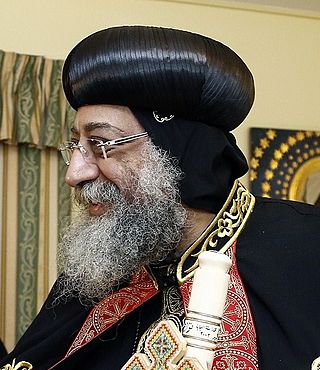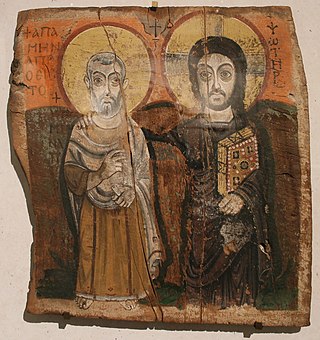
The Coptic Orthodox Church, also known as the Coptic Orthodox Patriarchate of Alexandria, is an Oriental Orthodox Christian church based in Egypt, serving Africa and the Middle East. The head of the church and the See of Alexandria is the Pope of Alexandria on the Holy Apostolic See of Saint Mark, who also carries the title of Father of fathers, Shepherd of shepherds, Ecumenical Judge and the 13th among the Apostles. The See of Alexandria is titular. The Coptic Pope presides from Saint Mark's Coptic Orthodox Cathedral in the Abbassia District in Cairo. The church follows the Coptic Rite for its liturgy, prayer and devotional patrimony. Christians in Egypt total about four million people, and Coptic Christians make up Egypt’s largest and most significant minority population, and the largest population of Christians in the Middle East.
Pope Avilius of Alexandria, was the 3rd Patriarch of Alexandria.

Kedron of Alexandria, also called Kedronos, was the 4th Patriarch of Alexandria.

Saint Simon the Tanner, also known as Saint Simon the Shoemaker is the Coptic Orthodox saint associated with the story of the moving the Mokattam Mountain in Cairo, Egypt, during the rule of the Muslim Fatimid Caliph al-Muizz Lideenillah (953–975) while Abraham the Syrian was the Pope of the Coptic Orthodox Church of Alexandria.

The Catholic Church in Egypt is considerably small as compared to the rest of the Christian population in Egypt, which is a significant minority among Muslims. The Catholic population in Egypt is said to have begun during the British control of Egypt. However, many returned to Europe after the 1952 Revolution in Egypt, which also caused the overthrow and exile of King Farouk of Egypt. Catholics in Egypt belong to seven distinct ritual Particular Churches sui iuris, the largest being the Coptic Catholic Church, led by its Patriarch of Alexandria.

Pope Heraclas was the 13th Pope and Patriarch of Alexandria, reigning 232–248.

The Pope of the Coptic Orthodox Church, also known as the Bishop of Alexandria, is the leader of the Coptic Orthodox Church, with ancient Christian roots in Egypt. The current holder of this position is Pope Tawadros II, who was selected as the 118th pope on November 18, 2012.

Pope Demetrius II of Alexandria, 111th Pope of Alexandria & Patriarch of the See of St. Mark.

Heliopolis was an early 20th Century suburb outside Cairo, Egypt, which has since merged with Cairo and is administratively divided into the districts of Masr al-Gadida and al-Nozha in the Eastern Area.

The Apostolic Vicariate of Alexandria of Egypt, or in full - of Alexandria of Egypt-Heliopolis-Port Said is the Roman Catholic Apostolic vicariate in Egypt, named after its cathedral see in Alexandria, a port city and former Catholic patriarchate.

The Monastery of Saint Fana is a Coptic Orthodox monastery. It is named after Saint Fana, also known as Bane, Coptic Christian hermit. The monastery is sometimes called the Monastery of Abu Fanah and is also known as the Monastery of the Cross, due to the presence of many beautifully decorated crosses inside its church.
Saint Fana, also known as Abu Fana, Abu Fanah, or Apa Bane was a Coptic hermit. The Monastery of Saint Fana in the diocese of Mallawi, Upper Egypt, is named after him.
Otto Friedrich August Meinardus was a German Coptologist and pastor who wrote numerous books and articles about Coptic Christianity in Egypt.

The Cathedral of Our Lady of Fatima or just Chaldean Catholic Cathedral in Cairo is a religious building that is affiliated with the Catholic Church and is located in the city of Cairo, the capital of the African country of Egypt.
The Monastery of Saint Ammonius, also known as the Monastery of the Martyrs, is a Coptic Orthodox monastery near Esna.
The Apostolic Vicariate of Heliopolis (of Egypt) (originally of the Nile Delta) was a Catholic missionary pre-diocesan jurisdiction of the Latin Church in northern Egypt.

The Annunciation Cathedral is a religious building affiliated with the Catholic Church that follows the Armenian rite and is located on Mohamed Sabri Street, Abou Alam, Abdine in Cairo, Egypt.

The Icon of Christ and Abbot Mena, also often known as Christ and His Friend, is a Coptic painting which is now in the Louvre museum in Paris, depicting Jesus Christ and Saint Menas together. The icon is an encaustic painting on wood and was brought from the Apollo monastery in Bawit, Egypt. The icon measures about 57x57cm and is 2 cm thick. The icon has been damaged over the years, with some of the pigment missing and it has two vertical cracks running through the image, yet is still in relative great condition and can still be readily analyzed.
Adel Zaky, O.F.M. was an Egyptian Roman Catholic prelate who served as the Apostolic Vicar of Alexandria since 2009 until 2019. Prior to his episcopal appointment, he served in various parishes across cities such as Cairo and was also the order's national provincial superior for a time before returning to parish work.













